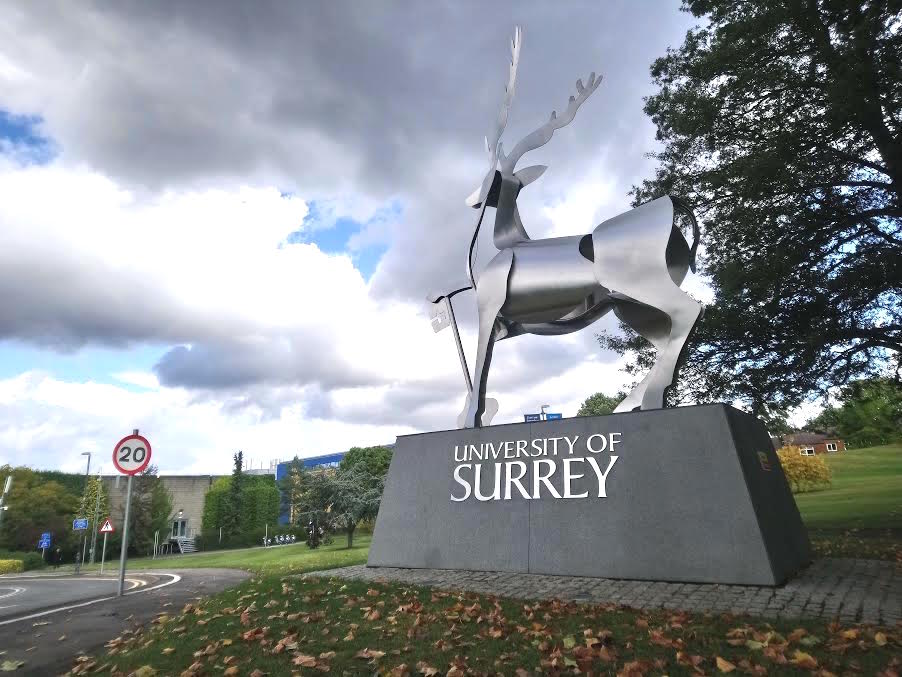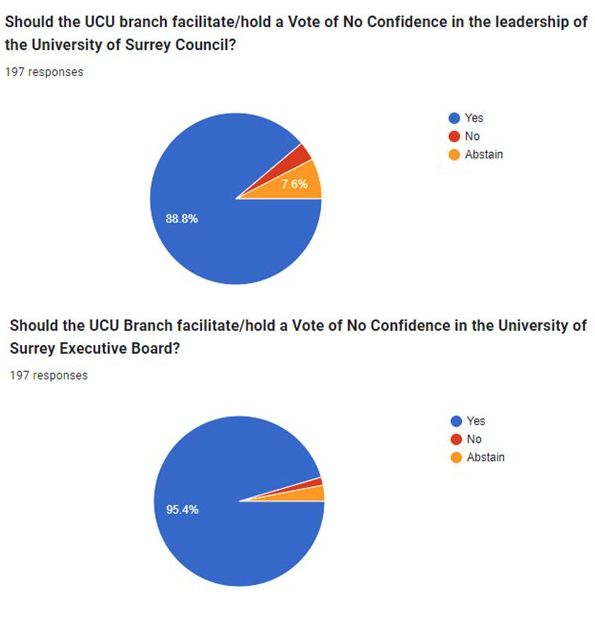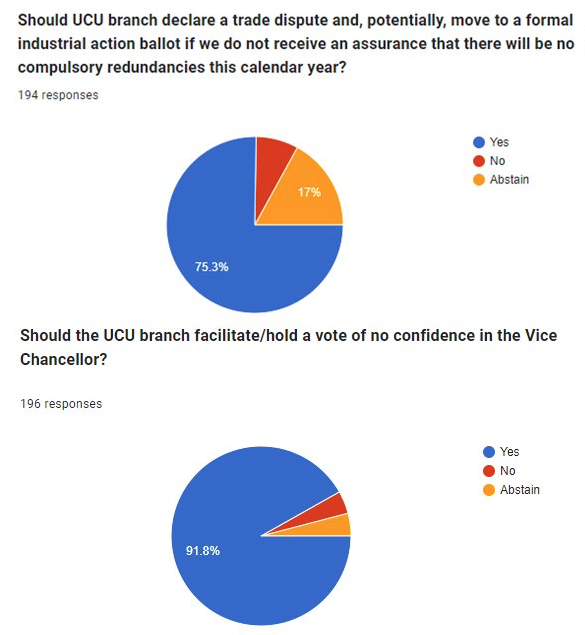 Abraham Lincoln
If given the truth, the people can be depended upon to meet any national crisis...
Abraham Lincoln
If given the truth, the people can be depended upon to meet any national crisis...
 Guildford news...
for Guildford people, brought to you by Guildford reporters - Guildford's own news service
Guildford news...
for Guildford people, brought to you by Guildford reporters - Guildford's own news service
Staff Union Warns Surrey University of No Confidence Votes
Published on: 23 Apr, 2024
Updated on: 25 Apr, 2024
local democracy reporter
Nearly 92 per cent of voters in a Surrey University College Union (UCU) survey supported holding a vote of no confidence in the Vice Chancellor, with 96 per in favour of a similar no-confidence vote for the university’s executive board.
A union spokesperson said the survey had been held this month to see whether there was appetite amongst staff and UCU members for a formal vote of no confidence and the survey was also an indicative ballot to see whether there was appetite for a formal industrial ballot.
The new survey echoed results of a survey held in 2019.
Surrey UCU, a union for teaching staff at the university, has been campaigning against “compulsory” redundancies and financial severance elicited by the University of Surrey in an all-staff emergency meeting on March 6. Vice Chancellor Professor Max Lu announced the university would have to cut staff and assets as part of cost-saving exercises.
According to the UoS’s website there are, in total, 3,000 staff at the university.
A UCU open letter dated April 11 alleged the university was trying to turn a “£10 million deficit” into a “£10 million surplus”. A spokesperson claimed staff feel they have been “coerced” into redundancy, or “feeling that their hand has been forced”.
An academic, who wished to remain anonymous, said: “It’s extremely distracting and upsetting… Commitment to the university falls and commitment to your work falls. You invest a lot of time into your institution and when your institution doesn’t value you back, you question why.”
Speaking about her department, she said: “It’s horrible. Morale is very low [and people feel] very insecure about their jobs”.
High inflation, soaring energy bills and overall cost of living pressures were cited in a response from the vice chancellor to the UCU as reasons why the university needed to reduce its expenditure. Sector-wide problems within higher education such as “devaluing domestic tuition fees” and declining numbers of international students “due to external factors” were also highlighted.
However, the UCU argued that poor financial management in “historical borrowing and significant spending on multi-million-pound projects” undermined the vice chancellor’s claim. Recent developments include the Surrey Institute for People-Centred AI (opened in 2021) and launching a new medical school with an intake for 2024.
Over 90 per cent of the university’s income was borrowed externally, the second highest percentage for UK universities in 2021/22. Gross debt increased by £16.6 million in 2022/23 to £296.5 million, as the university entered into a new £20 million loan, partially offset as a result of scheduled repayments, to support the purchase of a building on campus.
A steep rise in interest rates from 0.1 per cent interest rates in December 2021, to 5.25 in 2023, has increased repayments.
“It’s a reckless… way of living,” the academic said, “to borrow, borrow, borrow with the hope that you will make that money back.”
Rather than trying to “play with the big boys” and be a Russell Group university or UCL, the academic said, “Surrey needs to play to its strengths” as a small, safe university in Guildford which looks after its students.
Fewer Surrey UCU members voted to start formal industrial action (75.3 per cent) than those in favour of a no-confidence motion. Academic staff explained striking would mean taking teaching away from university students, who were not at fault.
The union is meeting on April 22 to discuss the next steps and has invited MP Angela Richardson and parliamentary candidates to attend.
A spokesperson from the University of Surrey said: “Our University is not immune to the unprecedented financial pressures facing the UK’s higher education sector – including high inflation, high energy costs, the sustained devaluation of tuition fees and the recent decline in international student numbers.
“We’re taking a focused and nuanced approach to tackling these sector-wide challenges at Surrey, with our approach designed to minimise the impact on our people and our core mission. We are looking at a variety of measures to increase income and save on costs including offering voluntary severance to some colleagues. We are hoping to avoid compulsory redundancies.”
See vice-chancellor’s response here.
See Surrey University’s annual review and financial statements here.

See Dragon story: GBC’s Explanation of Major Land Sale Notice Error ‘Borders on Arrogant’ Says Councillor







Recent Articles
- City and Manager ‘Part Company’ After Slide in Results
- PCC Election Result – Conservative Lisa Townsend Retains Commissioner Role
- Letter: It’s a Sad State of Affairs
- Times Rankings Showing GBC To Be Worst Council in Surrey Dismissed by Lib Dems
- Birdwatcher’s Diary No.303
- Letter: What a Scoop!
- Filmfest – a Festival of German Films
- Letter: Help Abroad Should Not Be to the Detriment of Those Here
- Armed Police Deployed After Fight at Ash Vale Pub – Four Arrested
- Surrey Schools Could Have ‘Meat-free Mondays’ If Strategy Adopted


Search in Site
Media Gallery
Dragon Interview: Local Artist Leaves Her Mark At One of England’s Most Historic Buildings
January 21, 2023 / No Comment / Read MoreDragon Interview: Lib Dem Planning Chair: ‘Current Policy Doesn’t Work for Local People’
January 19, 2023 / No Comment / Read MoreA3 Tunnel in Guildford ‘Necessary’ for New Homes, Says Guildford’s MP
January 10, 2023 / No Comment / Read More‘Madness’ for London Road Scheme to Go Ahead Against ‘Huge Opposition’, Says SCC Leader
January 6, 2023 / No Comment / Read MoreCouncillor’s Son Starts Campaign for More Consultation on North Street Plan
December 30, 2022 / No Comment / Read MoreCounty Council Climbs Down Over London Road Works – Further ‘Engagement’ Period Announced
December 14, 2022 / No Comment / Read MoreDragon Interview: GBC Reaction to the Government’s Expected Decision to Relax Housing Targets
December 7, 2022 / No Comment / Read MoreHow Can Our Town Centre Businesses Recover? Watch the Shop Front Debate
May 18, 2020 / No Comment / Read More










Recent Comments